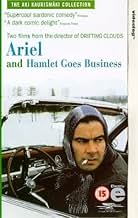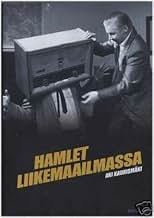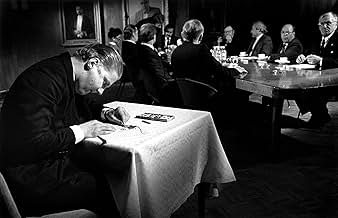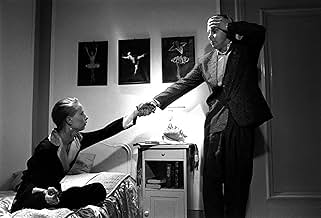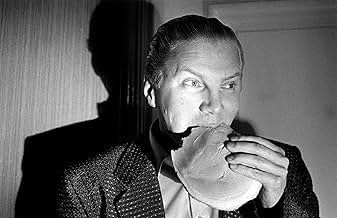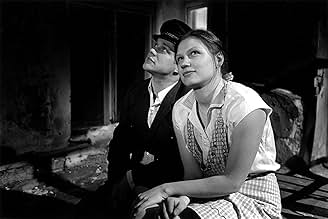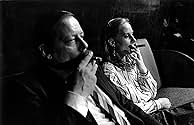Füge eine Handlung in deiner Sprache hinzuPlayboy Hamlet sees the ghost of his father, a paper baron in today's Finland.Playboy Hamlet sees the ghost of his father, a paper baron in today's Finland.Playboy Hamlet sees the ghost of his father, a paper baron in today's Finland.
- Regie
- Drehbuch
- Hauptbesetzung
- Auszeichnungen
- 1 wins total
- Simo
- (as Hannu Valtonen)
Empfohlene Bewertungen
It has become notorious for being somewhat flippant about it's source material (Shakespeare's Hamlet).
Actually, I don't remember finding this very humorous at all. In fact, a darker version of the Hamlet narrative could hardly be imagined.
This film represents an important historical turning point; although theatrical directors had been toying with the notion of "updating" Shakespeare, ever since Orson Welles produced a Broadway version of Macbeth with African Americans in the cast back in the late 1930s (When he made his own film version of MacBeth, he chickened out on this, unfortunately). But if the reader has seen the updated version of Romeo and Juliet out of Australia, or the Ethan Hawke Hamlet of 2000, or the recent "O" version of Othello (at last with black actors playing black roles, after all these centuries, for heaven's sake!), it all starts here.
Unfortunately, as I say, this film is so incredibly dark, you'll want to know why Hamlet didn't just cut his throat - "To be, or not to be - oh, the hell with it!" Not for every taste, to say the least.
In Aki Kaurismäki's version, the Kingdom of Denmark is a big Finnish factory (today we would call it a corporation, but the film was made before the Nokia era) that is run by the Hamlet dynasty, and is in danger of being taken over by a Swedish concern interested in in producing there ... rubber ducklings. The dramatic structure of the play is preserved, the hero's father is assassinated, his uncle and mother get married after a short time and plan to take over the kingdom ... sorry, the factory. The ghost appears, and the young heir Hamlet, until then more concerned with bringing the attractive Ophelia to bed, begins to plan revenge. Spectators will recognize many of the plays' lines, a theatrical performance will also appear, although the famous 'To be or not to be' is missing. This Hamlet has no philosophical pretensions but retains some of the ambiguity of the character.
The cinematography gives this film a special quality. Kaurismäki and cinematographer Timo Salminen use black and white but also specific 'film noir' angles as well as cinematic props from Orson Welles and Alfred Hitchcock's sets of tools. The actor who playes Hamlet, Pirkka-Pekka Petelius reminds the young Welles, while Kati Outinen's Ophelia seems to be borrowed from Ingmar Bergman's films. Music and other elements of pop culture combined with the style of gangster story present an original combination, which predates by almost a decade the first films of this genre made by Tarantino and the Coen brothers. With this 1987 film, Kaurismäki started to conquer the position of first-rate director of his generation, and created a version of 'Hamlet' that is like no other.
Also I was surprised to see how good Pirkka-Pekka Petelius was as Hamlet. He's mostly famous for being a comedian in many sketch shows, and this is honestly the first serious role I've seen him play. Of course this is a black comedy, a spoof of Hamlet, so the role is still not entirely serious.
While I love most things about this movie, it's that ending that kind of bothers me. After seeing this film several times I'm already used to it, but it still feels very separate from the rest of the movie. It's added by Kaurismäki, which might explain that. I could go into lengths what bothers me about this, but I'd rather not make this review sound exactly like the analysis we did in class, and also I don't want to spoil you.
The music chosen for this movie is amazing. The classical music and rock music go very well together. Most of the time there's a great harmony with what we see and what we hear, but even when there's not, it' amazing. And oh, the cinematography... Weird angles and crooked shots are so great. And of course the whole movie being in black and white amplifies the whole feeling. With colours, it wouldn't be the same film.
Hamlet Goes Business is an amazing take on Hamlet, and a great satire on business world. While it's clear I will not like all of Kaurismäki's movies, I can appreciate his work and I'm glad I've found a favourite
All of the main scenes from Shakespeare's play are present here, though sometimes (like the murder of Polonius) they don't make much sense in the context of the adaptation and are shown briefly to simply telegraph them. The dialogue is mainly original, though at times it switches into the traditional Finnish translation of Shakespeare's Elizabethan English to deliberately bizarre effect. There is however a laugh-out-loud twist ending going beyond the Shakespearean source material, which turns the film into a commentary on Finnish politics and labor relations.
All of Kaurismäki's films are dark comedies, though with humor so deadpan it is sometimes easy for an audience to miss it entirely. Riffing on the image of the Finnish people as taciturn and emotionless, Kaurismäki's actors are directed to state their lines in a very dry, robotic fashion. The death of Ophelia, a tragedy for the ages, is depicted here in a humorous way entirely due to Kati Outinen's deft facial expression and an unusual prop I won't spoil here. Kaurismäki's love of early rock 'n' roll and blues is present in all of his movies, and you can also expect to see a jukebox kicked into life here and a band performing on stage at some point.
While I am a fan of Kaurismäki and have seen nearly all of his many films, I don't think this is one of his major efforts. The black and white photography is a weak point. Kaurismäki loves utterly drab scenery and it is a big part of his aesthetic, but paradoxically color is necessary to bring this drabness across. It also feels like this is just one more adaptation of Hamlet, even if it's an unusual one, and none of the characters are as readily likable as in Kaurismäki's own original work. Most audiences will find his preceding effort VARJOJA PARATIISISSA (Shadows in Paradise) or his following film ARIEL to be more charming and visually seductive.
Wusstest du schon
- WissenswertesThe script was written in a very loose form and according to Aki Kaurismäki he only read Hamlet on the very week he wrote the script just a couple of weeks before filming.
- Zitate
Gertrud: [Hamlet is discussing with his mother] What I am going to say now is not just a whim. You'll understand if you just want to. I loved your father as much as you can demand a good wife to love a tyrant who never returns love, giving you as much passion as he gives to the winter tires of his car.
Hamlet: I ask you not to tarnish my father's memory.
Gertrud: I've been silent too long to gloss over the facts.
Gertrud: Then get to the point.
Gertrud: I'm going to marry Klaus. I love him.
- VerbindungenEdited from Melrose: Rich Little Bitch (1987)
- SoundtracksSymphony No. 11 in G minor, Op. 103
Composed by Dmitri Shostakovich
Top-Auswahl
Details
- Erscheinungsdatum
- Herkunftsland
- Sprache
- Auch bekannt als
- Hamlet Goes Business
- Drehorte
- Abrahaminkatu 1-5, Helsinki, Finnland(former University of Technology)
- Produktionsfirma
- Weitere beteiligte Unternehmen bei IMDbPro anzeigen
- Laufzeit
- 1 Std. 29 Min.(89 min)
- Farbe
- Sound-Mix
- Seitenverhältnis
- 1.85 : 1

